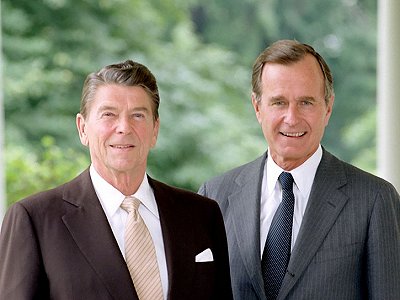
BACKING VOCALS
God has given us the assurance we need to live for him in our own skin, without aspiring to be someone else or to be more successful than they are
In the 1988 US Presidential campaign, George HW Bush was seeking election after two terms as Vice President to Ronald Reagan. Moving from number two to number one is a difficult task – just ask Al Gore. Bush made it, of course, but no thanks to a Democratic campaign ad which showed a man walking across a snowy field without leaving any footprints behind. This was an oblique but powerful critique of the anonymity of Bush and the lack of impression he allegedly made on the political environment.
It can’t have been easy being second in command to Reagan. He may have polarised opinion – it was that kind of decade – but few could doubt the charisma and charm he brought to the role of front man. By contrast, Bush looked pale, diffident, preppy. This is merely a vignette of a wider cultural landscape, where colourful personalities get noticed more quickly and stay in the memory longer than the reticent and the reserved.
This bias has strengthened as communities dissolve. We live and work more closely to people we do not know and feel the need to compete with them to get noticed and to get on. The quickest way to do this is to impose ourselves on others by force of personality, but this is shaky ground on which to make a life. Strength of character is the surest way to make the kind of impact which gives life to others rather than trying to get one over on them, and its virtues are forged by discipline over a long period.
August 24 is the day the global Church remembers the life of St. Bartholomew. Today’s glib media might call him a B list apostle. We’re not even sure which name to call him. The assumption of scholars is that Bartholomew is the Nathaniel of John chapter one and so I will proceed on this basis. We hardly know anything about him and the reading from Acts nominated by the Church of England for St. Bartholomew does not refer to him by name, alluding that he performed signs and wonders with the others. Instead it is Peter who gets the name check: people were clambering to touch his shadow, such were the powers of healing. Peter was the front man the crowds wanted to reach out and touch; Bartholomew was on backing vocals, some way back. At least this is how it appears.
Luke was methodical, but every historian must edit their account unsentimentally. History is full of remarkable people doing remarkable things whose lives have been entirely lost to posterity. Every history we read is layered with untold stories which are now beyond our reach. It is as if they have walked across that snowy landscape without making a mark.
The anxiety people feel about their status is palpable. Though we trumpet the existence of a society where all are of equal worth, and enshrine this in our lawmaking, the truth is less exalted. We make countless petty judgments of others and grade people according to their looks, weight, age, education and employment; by where they live, the clothes they wear, the cars they drive and the way they speak. While some judgments, like race, are taboo, others seem to be socially acceptable.
There is nothing especially new about this, as the Gospel writers suggest. In Luke 22, a dispute erupts among the disciples over which of them should be considered the greatest. This sterile debate is rendered even more tasteless by the way Luke locates it in the Last Supper, only hours before Jesus died on the cross and just minutes after he showed them how to remember this sacrifice in bread and wine. It was like taking a selfie at a funeral service.
Lording it over others takes its most grotesque form in the cults of personality which have littered human history and which still find their outlet in places like Belarus and North Korea. But the smaller temptations of positioning exist wherever people gather and we should not dismiss the disciples off for succumbing to it, for Jesus saw a nobler potential at work in them.
In John chapter one, Bartholomew had loudly traduced the emerging Jesus for coming from Nazareth. Like plenty of people today, he wrote another person off for where they came from. Despite his cynical wit, Jesus saw a deeper spirit in his detractor, calling him ‘an Israelite in whom there is no deceit’.
It astonished Bartholomew to learn that Jesus knew all about him, had seen him when he was still under the fig tree, shading himself like a consumer today cooling off with a lemonade in Costa. In this small instance, God gives us the assurance we need to live for him in our own skin, without aspiring to be someone else or to be better than they are. We are known by God. He has called each of us. Everything we do is remembered by him. All that we achieve in him will find its niche in the world to come. It will be part of a fresh history of the world told by God himself and one which will look very different to the textbooks by which we interpret our world. No footprint will be invisible.
POPULAR ARTICLES

Obama's Covert Wars
The use of drones is going to change warfare out of all recognition in the next decades.

Through A Glass Starkly
Images of traumatic incidents caught on mobile phone can be put to remarkable effect.

What Are British Values?
Is there a British identity and if so, what has shaped the values and institutions that form it?


